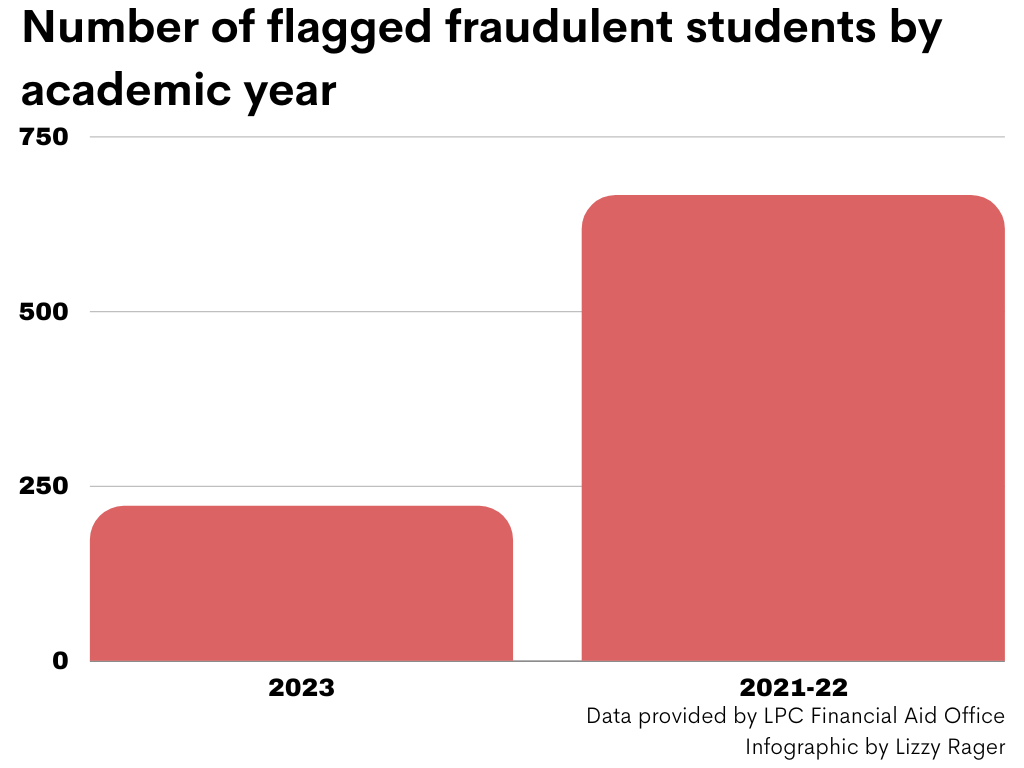Financial aid fraud rings are more prevalent than ever at Las Positas
Half of the students in your class may not be real.
Half of the students in a class you wanted to take but was full might not be real. A spot you may have needed for your major. A spot for a class with a professor you love. A spot that could’ve saved you a half-hour drive from home to Las Positas.
Unfortunately, financial aid fraud rings are the cause to this capacity issue. Fraud is a recurring issue for Las Positas every year and is especially problematic this semester.
According to Andi Schreibman, a financial aid officer at Las Positas since 1987, from 2021 to 2022, 666 students were flagged as fraudulent, and through this academic year, 221. Two weeks into spring, there are a suspected 100 to 200 fraudulent students taking up spots in classes – the largest group Las Positas has ever caught wind of.
Not only does this affect students, but taxpayers. Taxpayer money is being awarded to illegitimate receivers. Using the average cost per semester at LPC from 2021-22, this semester up to $110,400 in federal financial aid could have been awarded to fake students who enrolled at Las Positas.
Colleges have to return any federal financial aid paid out fraudulently, even if they can’t track down the student and recoup the funds. Schreibman says Las Positas has not awarded any financial aid to fraudulent studies, to the best of their knowledge. This does not mean they haven’t, though.
In January, Mary Lauffer, a business professor, noticed an unusual number of students enrolled in her classes, Business Communications and Work Experience.
“These courses typically have high enrollment, but enrollment generally increases more gradually. This one-day giant jump, which filled one of my Work Experience sections, was the first tip-off to possible fraud,” Lauffer said.
Lauffer informed Schreibman of the activity, who then notified LPC faculty and began an investigation. Schreibman says the process is like unpeeling an onion.
“As you start peeling back, suddenly, it leads you somewhere else. And then that leads you somewhere else. And suddenly, what started out to be about 20 fraudulent students in the class turned out to be well over 100,” Schreibman said.
Faculty are key in reporting anomalies to the Financial Aid office since the officers are not able to spot them until FAFSA, Free Application for Federal Student Aid, forms are received. Common patterns of fraud include similar email patterns, sudden jumps in enrollment, untypical class sizes than semesters past and email names that do not match the student names.
When a student is suspected of fraud at Las Positas, Admissions & Records sends an email asking for the student’s government-issued ID and a second supporting document, like a utility bill with a name and address, within a 24-hour window. If they are identified as fraudulent, they are dropped from classes, their account is put on hold so they cannot enroll and they do not receive aid from Las Positas.
“Neither Las Positas or any other college has the means to identify the individuals who use fake emails. Currently, only the Office of Inspector General can attempt to do that by investigating IP addresses and using other means,” said Jeff Lawes, an Admissions & Records officer.
Even if Las Positas catches a fraudulent student, however, they can still apply to multiple community colleges. Lawes says there is currently “no central repository of fraudulent IDs from all the colleges.”
Typically, these students come in groups, called fraud rings, and follow orders from a ring leader. The rings apply to community colleges since there is a low barrier to entry, and the tuition is comparatively cheap to four-years. If the fraudulent student was awarded a Pell Grant, for example, they could receive an amount that exceeded the cost of tuition to make a profit.
These individuals do not use their real identities, but rather, stolen ones. However, prisoners sometimes give out personal information for use. As long as a real name, Social Security Number and birthdate are present, FAFSA will process the application.
According to the Las Positas 2022-23 Financial Aid Policies, students discovered as fraudulent “will be reported to the U.S. Office of Inspector General for a federal investigation,” “will be required to repay all funds received” and “may be prosecuted for a felony, fined up to $20,000 and put in prison.”
Las Positas has seen its fair share of fraud rings. In 2012, the Las Positas Financial Aid office and the Office of Inspector General, a state-wide agency, conducted a thorough investigation and busted a fraud ring run out of Stockton. The ring leaders were arrested and had to pay a large fine.
“This has been going on for a long time. These rings are very prevalent in California, and they have been for over the last 15 years or so. But it’s getting worse all the time as they get more sophisticated,” Schreibman said.
In 2021, 20% of traffic on the CCC Apply website was bot-related, according to the Chancellor’s office. Lawes says Las Positas has no way to track how much activity is bot-related on the website, but the Financial Aid office has systems in place to filter out fraudulent students.
These systems, however, are costly, and community colleges are better able to combat fraud depending on their program funding. One student caught at Las Positas could go to another and slip through the cracks.
“We are hopeful that the Chancellor’s Office will be paying for this at the state level rather than requiring the colleges themselves,” Schreibman said.
While faculty are advised by the Financial Aid office to drop students if they do not show up for the first day of class, this does not always occur. Fraudulent students are the reason some classes are able to reach a class enrollment quota. In addition, some students log in to Canvas to seem like they are legitimate.
Schreibman says this issue needs to be tackled at the CCC Apply, or California Community College Apply website, level.
“The state really needs to put a better-coordinated effort together, where we share these identities, and they put a hold on it at the state level,” Schreibman said.
Most importantly, this issue impacts Las Positas students.
“They have the audacity to take up seats and keep real students from being able to get into them. And that’s what people should know about,” Schreibman said.
Lizzy Rager is the editor-in-chief of Express. Follow her @RagerWriter.



